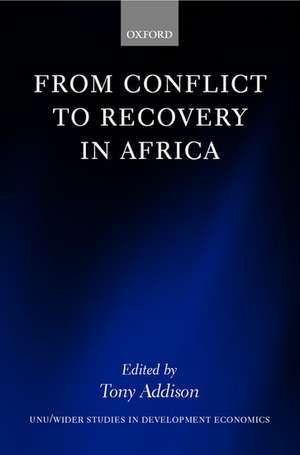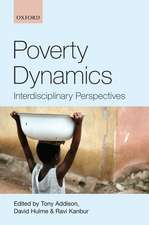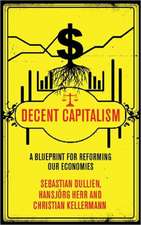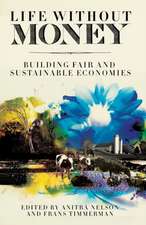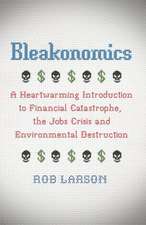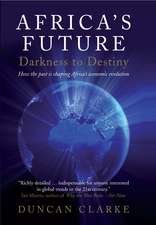From Conflict to Recovery in Africa: WIDER Studies in Development Economics
Editat de Tony Addisonen Limba Engleză Hardback – 13 feb 2003
Din seria WIDER Studies in Development Economics
- 30%
 Preț: 504.17 lei
Preț: 504.17 lei - 26%
 Preț: 734.44 lei
Preț: 734.44 lei - 30%
 Preț: 597.88 lei
Preț: 597.88 lei - 17%
 Preț: 594.16 lei
Preț: 594.16 lei - 12%
 Preț: 159.68 lei
Preț: 159.68 lei - 13%
 Preț: 737.02 lei
Preț: 737.02 lei - 17%
 Preț: 583.39 lei
Preț: 583.39 lei - 28%
 Preț: 473.92 lei
Preț: 473.92 lei - 30%
 Preț: 501.49 lei
Preț: 501.49 lei - 30%
 Preț: 724.70 lei
Preț: 724.70 lei - 30%
 Preț: 748.64 lei
Preț: 748.64 lei - 31%
 Preț: 434.64 lei
Preț: 434.64 lei - 18%
 Preț: 334.02 lei
Preț: 334.02 lei - 34%
 Preț: 847.76 lei
Preț: 847.76 lei - 34%
 Preț: 803.83 lei
Preț: 803.83 lei - 34%
 Preț: 953.65 lei
Preț: 953.65 lei - 34%
 Preț: 893.05 lei
Preț: 893.05 lei - 22%
 Preț: 188.78 lei
Preț: 188.78 lei - 30%
 Preț: 617.27 lei
Preț: 617.27 lei - 18%
 Preț: 334.18 lei
Preț: 334.18 lei - 27%
 Preț: 378.41 lei
Preț: 378.41 lei - 34%
 Preț: 1038.99 lei
Preț: 1038.99 lei - 34%
 Preț: 1043.08 lei
Preț: 1043.08 lei - 27%
 Preț: 329.58 lei
Preț: 329.58 lei - 34%
 Preț: 1292.22 lei
Preț: 1292.22 lei - 23%
 Preț: 1210.52 lei
Preț: 1210.52 lei - 34%
 Preț: 879.41 lei
Preț: 879.41 lei - 19%
 Preț: 652.21 lei
Preț: 652.21 lei - 34%
 Preț: 1039.15 lei
Preț: 1039.15 lei - 34%
 Preț: 892.84 lei
Preț: 892.84 lei - 27%
 Preț: 443.70 lei
Preț: 443.70 lei - 22%
 Preț: 526.67 lei
Preț: 526.67 lei - 30%
 Preț: 913.24 lei
Preț: 913.24 lei - 34%
 Preț: 997.55 lei
Preț: 997.55 lei - 31%
 Preț: 396.19 lei
Preț: 396.19 lei - 17%
 Preț: 413.16 lei
Preț: 413.16 lei - 34%
 Preț: 1188.13 lei
Preț: 1188.13 lei - 34%
 Preț: 817.45 lei
Preț: 817.45 lei - 30%
 Preț: 1012.76 lei
Preț: 1012.76 lei - 7%
 Preț: 360.77 lei
Preț: 360.77 lei - 31%
 Preț: 447.08 lei
Preț: 447.08 lei - 27%
 Preț: 1295.53 lei
Preț: 1295.53 lei - 31%
 Preț: 441.13 lei
Preț: 441.13 lei
Preț: 848.59 lei
Preț vechi: 1287.06 lei
-34% Nou
Puncte Express: 1273
Preț estimativ în valută:
162.42€ • 168.92$ • 136.11£
162.42€ • 168.92$ • 136.11£
Carte tipărită la comandă
Livrare economică 03-08 martie
Preluare comenzi: 021 569.72.76
Specificații
ISBN-13: 9780199261031
ISBN-10: 0199261032
Pagini: 314
Ilustrații: numerous figures, tables and maps
Dimensiuni: 163 x 241 x 23 mm
Greutate: 0.62 kg
Editura: OUP OXFORD
Colecția OUP Oxford
Seria WIDER Studies in Development Economics
Locul publicării:Oxford, United Kingdom
ISBN-10: 0199261032
Pagini: 314
Ilustrații: numerous figures, tables and maps
Dimensiuni: 163 x 241 x 23 mm
Greutate: 0.62 kg
Editura: OUP OXFORD
Colecția OUP Oxford
Seria WIDER Studies in Development Economics
Locul publicării:Oxford, United Kingdom
Recenzii
The present hot topics of security discourse have tended to shift attention away from Africa: a big mistake. This continent has been fated to play the role of proving-ground both for conflict's cruellest variants and for the most forward-looking solutions. It strongly illustrates the interweaving of various dimensions of human security, so vital for finding the answers to new threats like mass-impact terrorism. Tony Addison's edited volume focuses on the economic damage invariably done by conflict and the policy challenge of how to repair it, concluding that only an early and sustained effort to address structural reforms can do the trick.
This very timely book should be widely welcomed by social scientists and policy practitioners with an interest in development in post-conflict societies, especially in Africa ... Addison pulls together a clear set of policy recommendations that resonate well beyond the handful of countries on which this intensively researched collection was based.
It is sad that a book such as this must be written, but conflict is a tragic fact of life in the sub-Saharan region. This book brings hope for the future, through its sound, professional research. Again, WIDER demonstrates that it is on the 'cutting edge' of development economics.
I am confident that this book will serve as an excellent handbook for all those engaged in matters relating to poverty reduction, disarmament, demobilization and reintegration of combatants in Africa.
From Conflict to Recovery in Africa is an admirable work. In a painstaking and succinct manner the contributors have satisfactorily examined the whole array of difficult factors and variables that must be tackled if a broad-based recovery from conflict can be achieved ... In my capacity as Minister of Finance, Development and Economic Planning and later as Minister of Finance (1998-2001) in Sierra Leone I was in charge of efforts to manage the country's ruined economy to post conflict development. My regret is that this book was not available at that time, as the case studies would have provided many lessons for countries like Sierra Leone.
This is a well researched study that combines solid theoretical analysis with a deep understanding of the complex empirical realities of post-conflict reconstruction and development in Africa ... It sends a powerful message to the international community that it has an obligation to assist African countries to achieve durable peace.
From Conflict to Recovery in Africa is a tour de force, analyzing nation-states in Africa that confront multiple tasks of reconstruction from war, transition from socialism to liberalism, and attaining economic growth and poverty reduction. Readers will benefit from the insights of Tony Addison and contributors to our understanding of the economic development and transformation of Angola, Eritrea, Ethiopia, Guinea-Bissau, and Mozambique.
From Conflict to Recovery in Africa provides a comprehensive analysis of the challenge of reconstruction in the world's poorest continent. Based on case studies undertaken in five Sub-Saharan states, the volume focuses largely on the role of national actors in the recovery process, a perspective which enables the authors to make a particularly original contribution to our understanding of contemporary Africa.
The authors make a persuasive case that peacebuilding, economic reform, and democratization can and must go together in Africa. This book is essential reading for all concerned with the transition from war to peace.
From Conflict to Recovery in Africa is an outstanding contribution to the literature on conflict prevention and peace building ... While the book is based on excellent case studies of Angola, Mozambique, Guinea-Bissau, Ethiopia and Eritrea, its conclusions are widely applicable, even to conflict situations and crisis states outside of Africa. I highly recommend it to all those who are interested in the relationship between conflict prevention, peace building and long-term development, for which democratic governance is one of the most effective means of institutional capacity building for sustainable livelihoods and the eradication of poverty.
This very timely book should be widely welcomed by social scientists and policy practitioners with an interest in development in post-conflict societies, especially in Africa ... Addison pulls together a clear set of policy recommendations that resonate well beyond the handful of countries on which this intensively researched collection was based.
It is sad that a book such as this must be written, but conflict is a tragic fact of life in the sub-Saharan region. This book brings hope for the future, through its sound, professional research. Again, WIDER demonstrates that it is on the 'cutting edge' of development economics.
I am confident that this book will serve as an excellent handbook for all those engaged in matters relating to poverty reduction, disarmament, demobilization and reintegration of combatants in Africa.
From Conflict to Recovery in Africa is an admirable work. In a painstaking and succinct manner the contributors have satisfactorily examined the whole array of difficult factors and variables that must be tackled if a broad-based recovery from conflict can be achieved ... In my capacity as Minister of Finance, Development and Economic Planning and later as Minister of Finance (1998-2001) in Sierra Leone I was in charge of efforts to manage the country's ruined economy to post conflict development. My regret is that this book was not available at that time, as the case studies would have provided many lessons for countries like Sierra Leone.
This is a well researched study that combines solid theoretical analysis with a deep understanding of the complex empirical realities of post-conflict reconstruction and development in Africa ... It sends a powerful message to the international community that it has an obligation to assist African countries to achieve durable peace.
From Conflict to Recovery in Africa is a tour de force, analyzing nation-states in Africa that confront multiple tasks of reconstruction from war, transition from socialism to liberalism, and attaining economic growth and poverty reduction. Readers will benefit from the insights of Tony Addison and contributors to our understanding of the economic development and transformation of Angola, Eritrea, Ethiopia, Guinea-Bissau, and Mozambique.
From Conflict to Recovery in Africa provides a comprehensive analysis of the challenge of reconstruction in the world's poorest continent. Based on case studies undertaken in five Sub-Saharan states, the volume focuses largely on the role of national actors in the recovery process, a perspective which enables the authors to make a particularly original contribution to our understanding of contemporary Africa.
The authors make a persuasive case that peacebuilding, economic reform, and democratization can and must go together in Africa. This book is essential reading for all concerned with the transition from war to peace.
From Conflict to Recovery in Africa is an outstanding contribution to the literature on conflict prevention and peace building ... While the book is based on excellent case studies of Angola, Mozambique, Guinea-Bissau, Ethiopia and Eritrea, its conclusions are widely applicable, even to conflict situations and crisis states outside of Africa. I highly recommend it to all those who are interested in the relationship between conflict prevention, peace building and long-term development, for which democratic governance is one of the most effective means of institutional capacity building for sustainable livelihoods and the eradication of poverty.
Notă biografică
Tony Addison is Deputy Director of the World Institute for Development Economics Research (WIDER) of the United Nations University. He was previously Director of the Programme in Quantitative Development Economics at the University of Warwick, UK, and has been on the economics faculties of the universities of Warwick and London (School of Oriental and African Studies). He has also been a research fellow at the Overseas Development Institute (ODI), London, and has acted as consultant for DFID, ILO, UNICEF, and the World Bank. His current interests are in reconstruction from conflict, fiscal policy in low-income countries, and the debt problems of poor countries.
